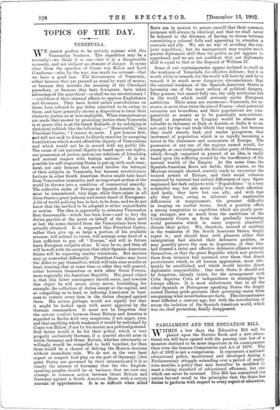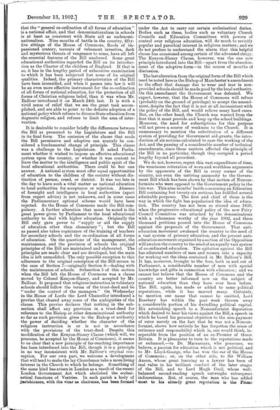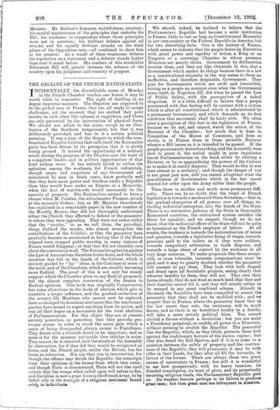PARLIAMENT AND THE EDUCATION BILL.
WITHIN a 'few days the Education Bill will be placed upon the Statute Book, and a new educa- tional era will have opened with the passing into law of a measure destined to be more important in its consequences than even the famous Compromise and Act of 1870. The Act of 1902 is not a compromise. It represents a national educational policy, maintained and developed during a Parliamentary struggle extending over a period of nearly nine months, a policy that may hereafter be modified to meet a rising standard of educational efficiency, but one which can never be reversed. This Bill has committed the nation beyond recall to the principles that the State has duties to perform with respect to every aspect of education, that the "general co-ordination of all forms of education" is a national affair, and that denominationalism in schools is at least as consistent with State aid as undenomi- nationalism. Nine months of battle in the country, fifty- five sittings of the House of Commons, floods of• im- passioned oratory, torrents of vehement invective, dark and mysterious threats of vengeance to come, have all left the essential features of the Bill unaltered. Some great educational authorities regarded the Bill on its introduc- tion as the Charter of the children of England. If that is• so, it has in the lengthy period of exhaustive examination to which it has been subjected lost none of its original qualities. Indeed, the primary characteristics of the Bill have been intensified, and when it passes into law it will be an even more effective instrument for the co-ordination of all forms of national education, for the protection of all forms of Christian religious belief, than it was when Mr. Balfour introduced it on March 24th last. It is with a vivid sense of relief that we see the great task accom- plished, and are able to point to the definite adoption of a national policy which refuses to divorce State education from dogmatic religion, and refuses to limit the area of inter- vention.
It is desirable to consider briefly the differences between the Bill as presented to the Legislature and the Bill in its final form. The omission of the clause that made the Bill permissive and adoptive can scarcely be con- sidered a fundamental change of principle. This clause was a challenge to the Legislature. It asked Parlia- ment whether it wished to impose an effective educational system upon the country, or whether it was content to leave the matter to the intelligence and public spirit of the local educational authorities. There could be but one answer. A national system must offer equal opportunities of education to the children of the country without dis- tinction of person, creed, or district. It was too late in the day to leave such a vital matter as national education to local authorities for acceptance or rejection. Absence of foresight and intelligence in local authorities (apart from expert advice) is not unknown, and in some cases the Parliamentary optional scheme would have been rejected. So the House of Commons made the Bill com- pulsory. A further alteration that must be noted is the great power given by Parliament to the local educational authority to deal with higher education. Originally the Bill only gave power to "supply or aid the supply of education other than elementary " ; but the Bill as passed also takes cognizance of the training of teachers for secondary schools and the co-ordination of all forms of education. On the questions of the management, the maintenance, and the provision of schools the original principles of the Bill are maintained and elaborated. The principles are made clear and are developed, but the main idea is left unmodified. The only possible exception to this adherence to the original conception of the Bill occurs in the case of Section 7—originally Section 8—dealing with the maintenance of schools. Subsection 5 of this section when the Bill left the House of Commons was a clause moved by Colonel Kenyon-Sla,ney, and accepted by Mr. Balfour. It proposed that religious instruction in voluntary schools should follow the terms of the trust-deed and be "under the control of the managers." On Wednesday in the House of Lords the Lord Chancellor introduced a proviso that cleared away some of the ambiguities of the clause. This proviso declares that nothing in the sub- section shall affect any provision in a. trust-deed for reference to the Bishop or other denominational authority so far as such provision gives to the Bishop or authority the rower of deciding whether the character of the religious instruction is or is not in accordance with the provisions of the trust-deed. Despite this modification of the Kenyon-Slaney Clause (which will, we presume, be accepted by the House of Commons), it seems to us clear that a new principle of far-reaching importance has been introduced into the Bill, though it is a principle in no way inconsistent with Mr. Balfour's original con- ception. For our own part, we welcome a development that will tend to make the lay Churchman take a more living interest in the Church to which he belongs. Something of the same kind, has arisen in London as a result of the recent London Government Act which abolished the ecclesi- astical functions of Vestries. In each parish a body of parishioners, with the vicar as chairman, has been formed. under the Act to carry out certain ecclesiastical duties. Bodies such as these, bodies such as voluntary Church Councils and Education Committees with powers of control over religious education, will do much to revivify popular and parochial interest in religious matters; and we do not profess to understand the alarm that this helpful clause has occasioned among certain of the advanced clergy. The Kenyon-Slaney Clause, however, was the one new principle introduced into the Bill—apart from the abandon- ment of the adoptive form—in the course of months of discussion.
The last alteration from the original form of the Bill which need be noted here is the Bishop of Manchester's amendment to the effect that damage due to wear and tear in non- provided schools should be made good by the local authority. On this amendment the Government was defeated. We expect, however, that the House of Commons will refuse (probably on the ground of privilege) to accept the amend- ment, despite the fact that it is not at all inconsistent with the policy of the Bill, and would relieve many hard cases. But, on the other hand, the Church was warned from the first that it must provide and keep up the school buildings. Moreover, the need for subscriptions for this purpose will not prove a source of weakness to the Church. It is unnecessary to mention the substitution of a different system of providing for Government aid-grants, the intro- duction of six sections calculated to ease the working of the Act, and the passing of a considerable number of technical amendments, since these matters affected the principle of the Bill in no particular, though they occupied a period lengthy beyond all precedent.
We do not, however, regret this vast expenditure of time, the wearisome reiteration of worn and worthless arguments by the opponents of the Bill in every corner of the country, nor even the untiring animosity to the Govern- ment Bill which has been shown by that section of Noncon- formists who were opposed to the Government policy in the late war. This nine months' battle concerning an Education Bill containing but twenty-six sections has fulfilled several admirable purposes. The first and chief of these is the way in which the fight has popularised the idea of educa- tion. The country has not been so stirred since 1839, when the progressive educational policy of the new Privy Council Committee was attacked by the denominations with a vehemence worthy of the year 1902, and three thousand petitions poured into the House of Commons against the proposals of the Government. That anti- education movement awakened the country to the need of a vast system of primary education, and the present anti- education movement organised by a section of the Opposition will awaken the country to the need of an equally vast system of co-ordinated education. The agitation against the Bill has educated numbers of men and women into a capacity for working out the ideas contained in Mr. Balfour's Bill. It has, moreover, brought to the fore, both in and out of Parliament, a considerable number of men with special knowledge and gifts in connection with education ; and we cannot but believe that the House of Commons and the country are better informed now on the subject of national education than they have ever been before. The Bill, again, has made or added to some political reputations, while it has ruarred many. Certainly, to mention one name that cannot be omitted, Lord Rosebery has within the past week thrown away a considerable portion of his dwindling political capital. His astonishing speech to a Nonconformist deputation which desired to hear his views against the Bill, a speech in which he based his personal objection to the non-payment of rates merely on the fact that he was not a Noncon- formist, shows how entirely he has forgotten the sense of reticence and responsibility which is, one would think, in- separable from the position of an ex-Premier of Great Britain. It is pleasanter to turn to the reputations made or enhanced,—to Dr. Ma,cnaruara, who possesses, we believe, a passion for education which is not political, and to Mr. Lloyd-George, who has won the ear of the House of Commons ; or, on the other side, to Sir William Anson, whose great learning as a lawyer has been of real value in his brilliant conduct of the later stages of the Bill, and to Lord Hugh Cecil, whose well- balanced second-reading speech outweighs subsequent indiscretions. But, of course, the man who has added most to his already great reputation is the Prime Minister. Mr. Balfour's firmness, watchfulness, courtesy ; his careful maintenance of the principles that underlie the Bill ; his readiness to compromise where those principles were not in question ; his brilliant defence against all attacks, and his equally brilliant attacks on the weak places of the Opposition case,—all combined to show him at his greatest. As a result of these wearisome debates his reputation as a statesman and a debater stands higher than ever it stood before. His conduct of this invaluable Education Bill will greatly increase the reliance of the country upon his judgment and tenacity of purpose.




















































 Previous page
Previous page